The Samsung SSD 830 Review
by Anand Lal Shimpi on September 24, 2011 1:02 AM EST- Posted in
- SSDs
- Storage
- Samsung
- pm830
- Samsung SSD 830
AnandTech Storage Bench 2011
Last year we introduced our AnandTech Storage Bench, a suite of benchmarks that took traces of real OS/application usage and played them back in a repeatable manner. I assembled the traces myself out of frustration with the majority of what we have today in terms of SSD benchmarks.
Although the AnandTech Storage Bench tests did a good job of characterizing SSD performance, they weren't stressful enough. All of the tests performed less than 10GB of reads/writes and typically involved only 4GB of writes specifically. That's not even enough exceed the spare area on most SSDs. Most canned SSD benchmarks don't even come close to writing a single gigabyte of data, but that doesn't mean that simply writing 4GB is acceptable.
Originally I kept the benchmarks short enough that they wouldn't be a burden to run (~30 minutes) but long enough that they were representative of what a power user might do with their system.
Not too long ago I tweeted that I had created what I referred to as the Mother of All SSD Benchmarks (MOASB). Rather than only writing 4GB of data to the drive, this benchmark writes 106.32GB. It's the load you'd put on a drive after nearly two weeks of constant usage. And it takes a *long* time to run.
1) The MOASB, officially called AnandTech Storage Bench 2011 - Heavy Workload, mainly focuses on the times when your I/O activity is the highest. There is a lot of downloading and application installing that happens during the course of this test. My thinking was that it's during application installs, file copies, downloading and multitasking with all of this that you can really notice performance differences between drives.
2) I tried to cover as many bases as possible with the software I incorporated into this test. There's a lot of photo editing in Photoshop, HTML editing in Dreamweaver, web browsing, game playing/level loading (Starcraft II & WoW are both a part of the test) as well as general use stuff (application installing, virus scanning). I included a large amount of email downloading, document creation and editing as well. To top it all off I even use Visual Studio 2008 to build Chromium during the test.
The test has 2,168,893 read operations and 1,783,447 write operations. The IO breakdown is as follows:
| AnandTech Storage Bench 2011 - Heavy Workload IO Breakdown | ||||
| IO Size | % of Total | |||
| 4KB | 28% | |||
| 16KB | 10% | |||
| 32KB | 10% | |||
| 64KB | 4% | |||
Only 42% of all operations are sequential, the rest range from pseudo to fully random (with most falling in the pseudo-random category). Average queue depth is 4.625 IOs, with 59% of operations taking place in an IO queue of 1.
Many of you have asked for a better way to really characterize performance. Simply looking at IOPS doesn't really say much. As a result I'm going to be presenting Storage Bench 2011 data in a slightly different way. We'll have performance represented as Average MB/s, with higher numbers being better. At the same time I'll be reporting how long the SSD was busy while running this test. These disk busy graphs will show you exactly how much time was shaved off by using a faster drive vs. a slower one during the course of this test. Finally, I will also break out performance into reads, writes and combined. The reason I do this is to help balance out the fact that this test is unusually write intensive, which can often hide the benefits of a drive with good read performance.
There's also a new light workload for 2011. This is a far more reasonable, typical every day use case benchmark. Lots of web browsing, photo editing (but with a greater focus on photo consumption), video playback as well as some application installs and gaming. This test isn't nearly as write intensive as the MOASB but it's still multiple times more write intensive than what we were running last year.
As always I don't believe that these two benchmarks alone are enough to characterize the performance of a drive, but hopefully along with the rest of our tests they will help provide a better idea.
The testbed for Storage Bench 2011 has changed as well. We're now using a Sandy Bridge platform with full 6Gbps support for these tests.
AnandTech Storage Bench 2011 - Heavy Workload
We'll start out by looking at average data rate throughout our new heavy workload test:
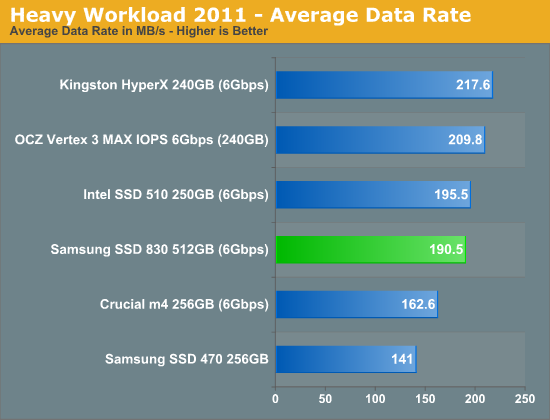
The SSD 830 manages to get within 13% of the SF-2281 based HyperX. While the old 470 couldn't really compete with the current generation of 6Gbps drives, the 830 holds its own. In the performance breakdown we see it's actually in the average read performance that the 830 falls behind. Its lackluster performance here is a bit surprising but given how well the SandForce drives perform it looks like the controller may just be getting bogged down by a bunch of IOs that SF just throws away, which in turn impacts its ability to deliver higher read performance.
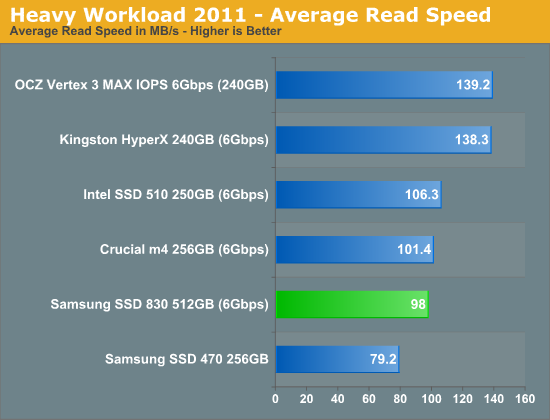
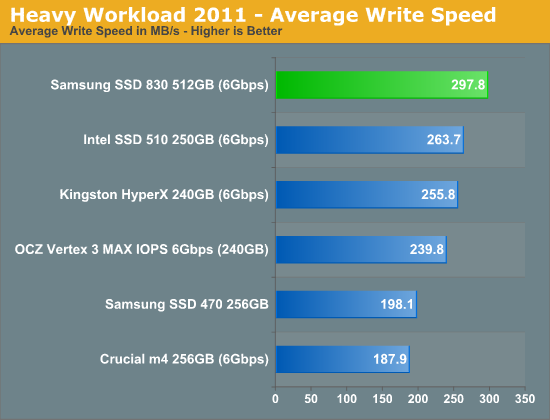
The SSD 830 actually does the best out of all of these drives when it comes to pure write speed. This isn't too surprising given how well the 830 performed in our incompressible sequential write test.
The next three charts just represent the same data, but in a different manner. Instead of looking at average data rate, we're looking at how long the disk was busy for during this entire test. Note that disk busy time excludes any and all idles, this is just how long the SSD was busy doing something:
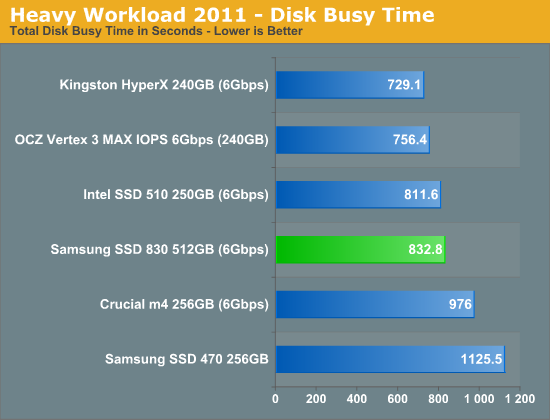
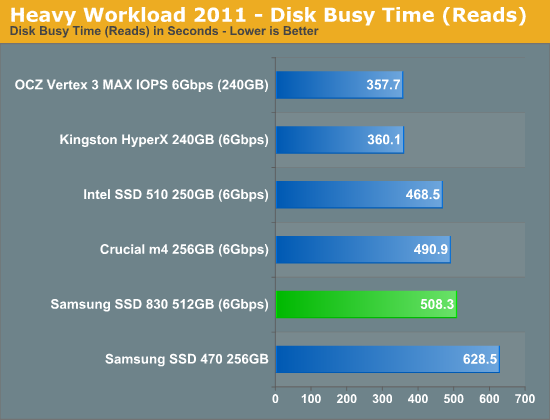
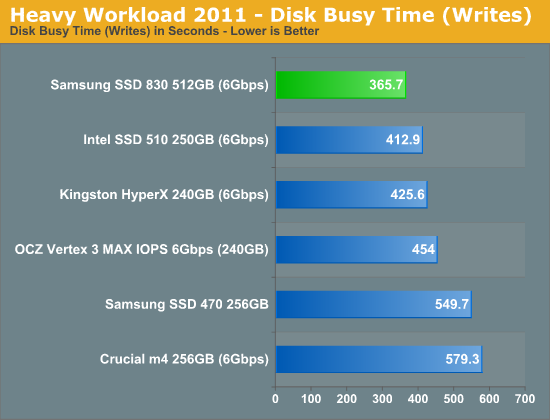










99 Comments
View All Comments
Gilbert Osmond - Saturday, September 24, 2011 - link
Didn't read the article yet, but I sure did post the first comment. Looks like a fun read.Stahn Aileron - Saturday, September 24, 2011 - link
Do people seriously still do this? You think people would grow up and out of dumb habits eventually.Mumrik - Tuesday, September 27, 2011 - link
You'd think so, but GiantBomb even has an site achievement for getting first post (and not writing "first").vol7ron - Friday, October 7, 2011 - link
But shouldn't it be okay if you post w/in the minute of it listing? Or, if it is published at some ungodly hour, like 4:39AMorangpelupa - Saturday, September 24, 2011 - link
atleast he is polite and honest :Dkevith - Saturday, September 24, 2011 - link
Some seems to believe this is another Facebook....Aloonatic - Saturday, September 24, 2011 - link
Aloonatic likes this *thumbs up*tipoo - Saturday, September 24, 2011 - link
But by replying, we made the useless thread longer....So did this comment, but lets try not to in the future ;)AT's comments do need some work though, edit button + downrank/hide option for comments like these would be miles improved by themselves.
DigitalFreak - Saturday, September 24, 2011 - link
Die in a fireiamezza - Wednesday, September 28, 2011 - link
First posts should be auto-deleted when containing the word 'first' ;)